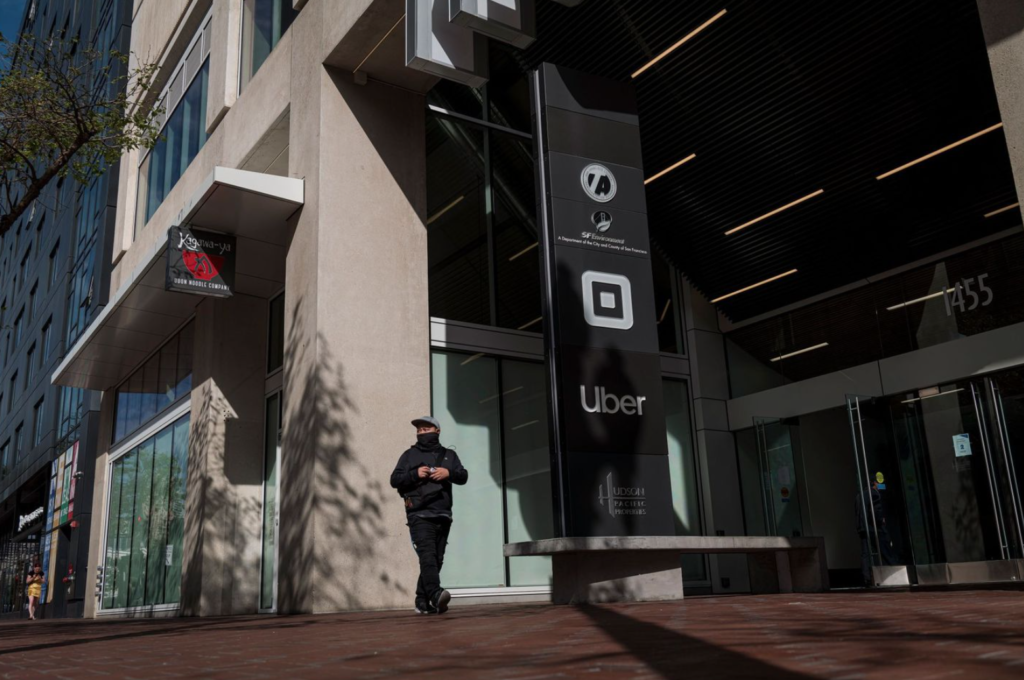By
A coalition of tech giants is officially setting its sights on Massachusetts as the latest battleground in the fight over the status of gig economy workers.
They plan to file on Wednesday a ballot question that would allow them to continue classifying Uber, Lyft, Instacart, and DoorDash drivers and deliverers as independent contractors, not employees while granting the workers some new benefits.
Powerful organized labor groups — who, along with a lawsuit from Attorney General Maura Healey, argue those workers must be treated as employees under state law — say they will ferociously oppose the effort, setting the stage for a lengthy, expensive, and nationally watched fight over workers’ rights and the future of the gig economy. The measure makes Massachusetts the next front for the high-octane dispute that recently dominated the airwaves in California, where Proposition 22 became the most expensive ballot measure in state history.
Industry giants, working under the banner of the Massachusetts Coalition for Independent Work, are pitching the ballot question that, if approved by voters, would label Uber drivers, DoorDash and Postmates delivery people, Instacart shoppers, and other app-based workers as independent contractors while granting them new benefits including health care stipends, paid sick time, paid family and medical leave, and occupational accident insurance. When they are engaged in rides and deliveries, but not while they are waiting for pickups, drivers would be guaranteed to make at least 120 percent of the state minimum wage — a total of $18 an hour in 2023 when the measure would go into effect. They would also receive 26 cents per mile toward vehicle expenses.
“A lot of the laws are not written according to modern times when it comes to employees,” said James Hills, a spokesman for the industry coalition. “The companies are leading this and supporting this because it gives their drivers the flexibility and the opportunity to earn as they are able.”
Labor advocates, united behind the new and similarly named Coalition to Protect Workers’ Rights, said app-based workers should not have to choose between flexible schedules and the labor rights and benefits guaranteed under state law. A 2004 Massachusetts law makes clear, they say, that workers are to be classified as employees if they are being directed by the company that hires them, are working within the normal scope of the business, or are doing a job that is not part of an independently established occupation.
And they said the benefits proposed in the ballot measure fall far short of what employees are guaranteed and other industry standards.
The IRS reimbursement standard, for example, is 56 cents per mile, more than twice the 26 cents proposed in the ballot measure. (Drivers, because they are labeled independent contractors, can already use the 56 cent per mile standard for calculating their tax deductions.) And paying app-based workers only for “engaged time” — not while they are waiting for or between trips — is an overly strict standard that will prevent workers from accessing benefits, opponents said.
Beth Griffith, an Uber driver and a spokeswoman for the labor coalition, called the ballot language “a Trojan Horse” and “a false choice, that takes basic rights and benefits away from workers, while falsely pretending to offer new ones.”
“The ballot language from Uber and Lyft is a $100 million ploy to avoid paying taxes, avoid paying workers fairly, and allow Big Tech companies to buy their way out of the basic benefits and protections for workers in every other business,” Griffith said. “Drivers and delivery workers, most of us Black, Brown and immigrants, are tired of being treated like ‘second class’ workers by these multibillion-dollar tech companies . . . This ballot language hurts customers, drivers, and taxpayers, all to enrich Silicon Valley executives.”
The labor coalition has the backing of the Massachusetts AFL-CIO, the Service Employees International Union’s state council, and the ACLU of Massachusetts.
Submitting ballot language to Healey’s office is just the first step in a long process. The path ahead will take months, require tens of thousands of signatures, and could spin off into side legal battles over the precise language that may appear before 2022 voters.
The fight comes against the backdrop of a more labor-friendly Biden administration, as well as an ongoing lawsuit from Healey, who sued Uber and Lyft last year, arguing they were illegally cheating drivers by classifying them as independent contractors. That case is still pending.
The battle here may have similar contours to the debate that took place in California. On the state’s Proposition 22, which passed in 2020, voters sided with the technology companies, allowing them to continue to treat drivers as independent contractors and granting them some benefits, including minimum pay. After the victory, executives started to look across the country to expand the win.
The ballot question proposed by the industry coalition would provide Massachusetts drivers who work at least 15 hours of “engaged time” per week with a partial health care stipend, and those working 25 or more hours per week full stipends equal to 100 percent of a Massachusetts Health Connector plan premium.
Data from the industry coalition show that most Massachusetts drivers work less than 15 hours per week. That means most would not currently qualify for any health care stipend. Under a similar California provision, just 15 percent of drivers have applied for the stipend, according to a poll commissioned by a union.
The ballot measure would also require several paid safety training sessions for drivers, including topics like collision avoidance and preventing sexual assault. Workers could also accrue up to 40 hours of paid sick time in a calendar year and would be enrolled in the state’s paid family and medical leave system.
Employees under Massachusetts state law are guaranteed far more generous benefits, the labor coalition said.
If the attorney general’s office — which is currently suing the ride-hailing apps, claiming they are illegally misclassifying drivers — certifies that the question meets the state’s constitutional requirements, the coalition has a couple of months to gather more than 80,000 signatures. Then, unless there is action on the measure from the Legislature, it would need to gather more than 13,000 additional signatures next year.
The debate could also be resolved at any time on Beacon Hill, where some lawmakers are pushing bills to grant drivers certain benefits.
Two Democrats, state Representatives Carlos González of Springfield and Mark Cusack of Braintree, have filed a bill that would establish “portable benefit accounts” for app-based drivers, in which a ride-hailing company would pay a contribution of 4 percent of the driver’s earnings from the previous three-month quarter, money the worker could put toward health care costs or a retirement fund. That measure, which has the support of the industry coalition, has yet to get a hearing.
González said the drivers he has spoken with, many of them Latino or single mothers, told him they want benefits without the limitations of an employer who might restrict the time off they can take or dictate work schedules. And he said having a robust legislative debate would allow the state to skirt a costly ballot slugfest.
“I think we should be able to sit down at the State House and see both sides of the agenda and have a conversation about what’s in the best interest of the drivers and get this done through a legislative measure,” González said.
The hundreds of millions of dollars spent on the California ballot measure “could’ve gone to the drivers . . . and it would’ve done greater good,” he added.
Both sides claim to have the support of the workers whose benefits are at issue, pointing to rival surveys that framed the question differently and came to different conclusions.

